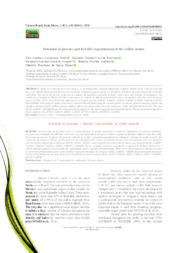Potential of parents and hybrids experimental of the yellow melon.
Potential of parents and hybrids experimental of the yellow melon.
Autoria: CAVALCANTE NETO, J. G.; FERREIRAM K. T. C.; ARAGAO, F. A. S. de; ANTONIO, R. P.; NUNES, G. H. de S.
Resumo: Melon or muskmelon (Cucumis melo L.) is of considerable economic importance in Brazil. Nearly all the cultivars currently grown are hybrids. Heterosis has been used to advantage in the melon plant, and the use of uniform hybrids is one of the reasons for successful cultivation. The aim of the present study was to evaluate the agronomic potential of yellow melon lines and hybrids. An experiment was conducted in randomized blocks with three replications to evaluate 24 hybrids generated by crosses among three elite lines used as female parents (AF-01, AF-02, and AF-03) and eight lines used as male parents (LAM-01, LAM-02, LAM-03, LAM-04, LAM-05, LAM-06, LAM-07, and LAM-08). Yield and fruit quality traits were evaluated. Partial diallel analysis was carried out to estimate general combining ability and specific combining ability. Additive and non-additive effects were observed for the yield, mean fruit weight, and pulp thickness traits. The lines AF-02, LAM-02, and LAM-03 are the most promising as parents as they more frequently have favorable alleles. The most prominent hybrids in diallel analysis were AF-02 x LAM-02, AF-02 x LAM-03, AF-02 x LAM-04, and AF-03 x LAM-06.
Ano de publicação: 2020
Tipo de publicação: Artigo de periódico
Unidade: Embrapa Agroindústria Tropical
Palavras-chave: Cucumis Melo, Hibrido, Hortaliça, Melons, Melão, Melão amarelo
Observações
1 - Por padrão são exibidas publicações dos últimos 20 anos. Para encontrar publicações mais antigas, configure o filtro ano de publicação, colocando o ano a partir do qual você deseja encontrar publicações. O filtro está na coluna da esquerda na busca acima.
2 - Para ler algumas publicações da Embrapa (apenas as que estão em formato ePub), é necessário ter, no celular ou computador, um desses softwares gratuitos. Sistemas Android: Google Play Livros; IOS: iBooks; Windows e Linux: software Calibre.
Acesse outras publicações
Acesse a Base de Dados da Pesquisa Agropecuária (BDPA) para consultar o acervo completo das bibliotecas da Embrapa.

